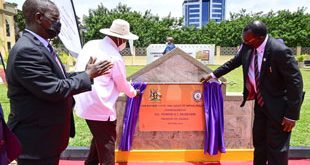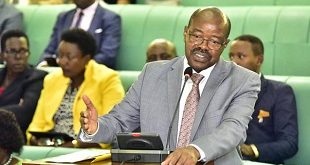
Kampala, Uganda | THE INDEPENDENT | Two weeks into the hearing of election petitions, the courts have been advised against declaring runners-up, who successfully challenged the elections of their opponents as winners without going back for by-elections.
Supreme Court Justice Prof. Lillian Tibatemwa Ekirikubinza and Makerere University law lecturer, Dr Busingye Kabumba, say this is the highest form of disenfranchising voters. The two senior legal scholars argue that if the court is satisfied that indeed the person who won the vote probably should not have been the one, the question of who should be rightfully elected should be thrown back to voters to determine.
In their book titled, ‘Enhancing Electoral Justice in Uganda’s Parliamentary Elections, The Search for Dependable Precedent, in which the two authors reviewed 74 out of 82 Parliamentary Elections Appeal before the Court of Appeal, the case of Wakayima Musoke Hanington against the Electoral Commission and Robert Sebunya feature prominently.
In this case, both the High Court and the Court of Appeal overturned the election of Wakayima on the ground of discrepancies in his name. Instead of ordering for a fresh election, as it is always the norm, the court ruled that Sebunya who was the first runner-up be declared the winner. The authors argue that although in terms of Section 63 (4) of the Parliamentary Elections Act, the Court has the power to declare that a candidate, other than the person declared elected, was the validly elected MP, declaring another person as the elected MP, somewhat disenfranchises voters.
“In Wakayima and EC v. Sebunya, having found that the 1st appellant [Wakayima] was nominated in error, with him off the scene, the respondent [Sebunya] was the person with the highest number of votes that the people of Nansana municipality voted for as their Member of Parliament. In accordance with Section 63 (6) (b) of the PEA, the respondent was the person entitled to be declared the duly elected Member of Parliament for the constituency. The trial judge could not be faulted in duly declaring him so. [But] this is the disenfranchisement of voters who elected the ineligible candidate. They were entitled to be given the opportunity to select another candidate. If this standard were adopted, it would mean in all cases where the winning candidate is disqualified, the runner-up should be declared winner of the race. The decision to declare the runner-up a winner in Wakayima was, therefore, a grave anomaly that ought not to be encouraged,” reads part of the 182-page book, which was undertaken, with the aim of providing easily accessible information on jurisprudence coming out of Uganda’s courts relating to parliamentary election petitions.
The Kituo Cha Katiba commissioned book also cautions the courts against awarding extraneous costs to winning parties arguing that this might discourage people with genuine concerns arising out of elections from going to court.
“Costs follow the event unless for good reason, the court-ordered otherwise…Costs were not meant to be punitive, but to indemnify or compensate the successful party for the expenses they incurred during the litigation… In making its decision on costs, the court had to balance the principle of compensating a successful litigant and thereby letting justice take its course and the principle that poor litigants should not be discouraged from accessing justice through the award of exorbitant costs… At the same time, election petitions were matters of national and/or political importance, a factor which a court should bear in mind while awarding costs…,” the authors argue.
The book also takes exception in having cases with similar facts determined not only differently at the High court and the Court of Appeal but also sometimes by the same justices. It therefore, calls for an urgent peer-to-peer reflection and dialogue at the Court of Appeal level in order to have predictability on how similar cases can be determined.
“As the apex court for parliamentary election litigation, the court is supposed to be the last word on the law, providing clarity and coherence in the relevant legal standards. This is the very foundation of the country’s legal system – the notion of firm and dependable precedent – stare decisis. If the Court of Appeal has not been able to achieve consensus on several key issues, how are the lower courts – particularly the High Court, which serves as the court of the first instance for parliamentary election disputes – to be guided,” the authors note.
They call upon parliament to consider amending again the Parliamentary Elections Act to reintroduce the Supreme Court as the final court of arbitration in elections matters. “Given that the Supreme Court is the final court of appeal in Uganda, whose decisions on questions of law are binding on all courts throughout Uganda, it is advised that some questions of the law will be so important as to require finality in their determination, by the apex court. For that matter, and considering as well the interest in having the election disputes conclusively decided within a short time, the law ought to be amended to create a special avenue for filing a final appeal to the Supreme Court on a pure question of law with the certificate of the Court of Appeal or the Supreme Court itself that the question is one of high public importance,” the authors note.
Before 2015, all electoral matters would be appealed up to the Supreme Court. However, some petitions would take almost the entire period of five years, which an MP is elected for. Therefore defeating the purpose for which people were challenging the victory of such an MP if the court process is to allow them complete the entire term before a final determination is made.
*****
URN
 The Independent Uganda: You get the Truth we Pay the Price
The Independent Uganda: You get the Truth we Pay the Price

